On a January evening, women from the Capital Region gather around plates of homemade Indian vegetable korma and garlic naan, repeating the Dining for Women dinner affirmation out loud in unison: As we share food, we share something of ourselves and we honor each other. We recognize the powerful associations of women to food, life and nurture in all cultures … By eating together as women … we express the hope that through our efforts, they may find more sustenance for their lives. May we all be able to feast together some day.
American River chapter members gather at Barbara Cummin’s home
for a monthly Dining for Women meeting. (Photo courtesy Ingrid
Rosten)
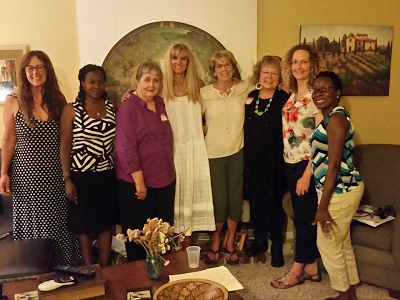
Ingrid Rosten, the Dining for Women American River chapter leader and the evening’s host at her home in Rancho Cordova, holds her hand to her heart. “Isn’t that something,” she says.
Dining for Women is a global nonprofit organization founded in 2003 that funds projects to help women and girls in developing countries. The organization operates through a collective giving structure — members pool money together that would have otherwise been spent on a group dinner out and instead eat at a member’s home, while learning about the recipient of the group donation.
“There’s a basic framework: We encourage eating, socializing, learning and supporting each other and all participating together so each chapter can be successful,” says Linda Dougall, co-leader for the West region.
Related: Nonprofit urban farms want to end food insecurity
Related: Submit your Cap Cares success story
The DFW headquarters in Greenville, S.C. — with 407 chapters worldwide and 8,000 active members— screens and selects 12 grantees annually, giving them up to $50,000 each to fund grassroots projects fighting gender inequality in developing countries. Funding comes from member donations, collected from those monthly dinners. “Headquarters screens and interviews all the different applicants. This takes the burden off all of us in the chapters,” says American River Elizabeth Dodson. “We know they’ve already done the due diligence.”
Member Reem Al Olaby’s Junior Girl Scouts present to the American
River chapter about grantee Caravan to Class. (Photo courtesy of
Reem Al Olaby)
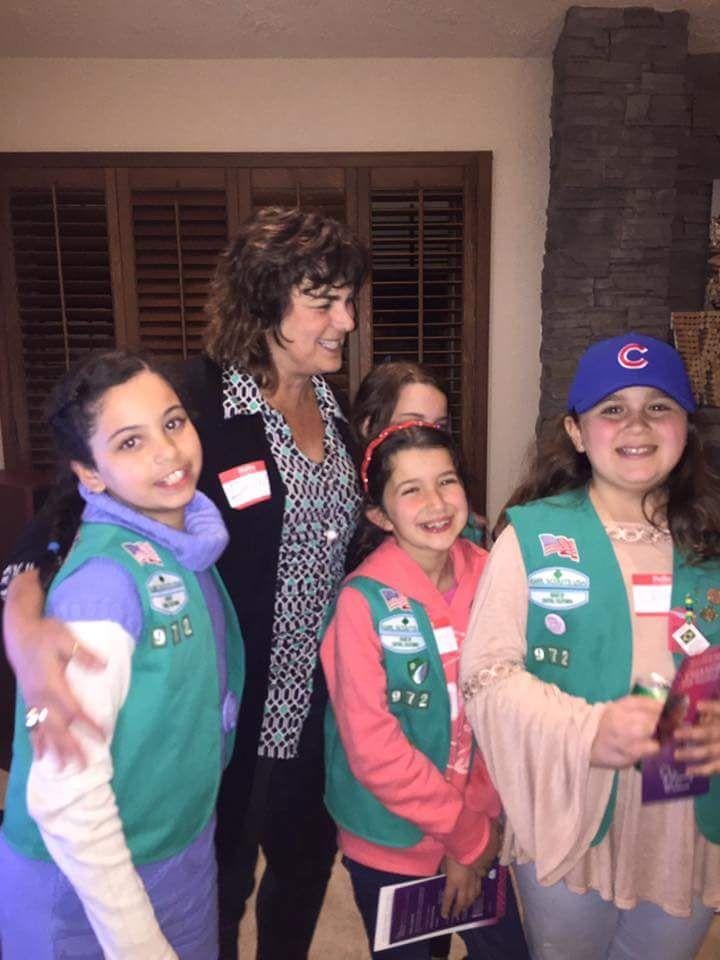
Through this process, members can “feel really good about how their dollars are being used,” says Wendy Frattolin, DFW’s communications and membership director. “These projects are some of the best around that can have the greatest impact.”
Unlike most other giving circles, DFW has no minimum giving requirement, and relatively small monthly donations — on average $35 — aggregated across all chapters, have exceeded $1 million annually for the last three years. The 18 active members of the American River chapter have raised $5,010 since Rosten founded the chapter in 2016.
“It’s a testament that small gifts, when combined, can make a really big difference,” Frattolin says, adding, “In this way, even individuals have power to make change in the world.”
Education Forges Connections
For Dining for Women, education is just as important as charitable giving. At chapter meetings, members learn about grantee organizations, the women they serve and the countries these women come from through videos, financial presentations, recipes and reports.
Dining for Women organizes trips to visit past grantees, like
Girl Determined in Mandalay, Myanmar.( Photo credit: Linda
Dougall)
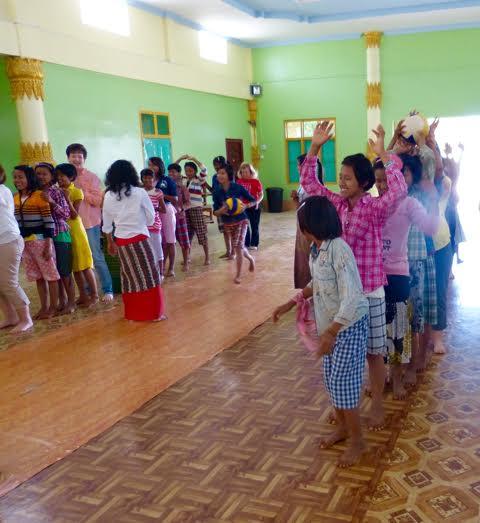
At the January meeting, Rosten introduces the newest grantee, Asia Initiatives, which is using a $47,414 grant to bring micro-poultry farming to rural women in India. The grantee was selected for its innovative use of “Social Capital Credits” as currency between the women. Asia Initiatives incentivizes rural women to make decisions beneficial to their families and the village as a whole to earn SoCCs, which are then used to “buy” resources to establish their own micro-poultry farms and join the village-wide poultry cooperative.
In this way, the women simultaneously feed their families, discover entrepreneurship and economic self-sufficiency, and gain access to health care and education for them and their children, all under the pretext of learning about micro-poultry farming.
While Rosten plays an interview between headquarters and Asia Initiatives, the American River members discuss the project’s financial breakdown and the benefit of raising chickens to feed a country where beef is sacred and other food sources are scarce. After learning that women earn SoCCs for not eating their chickens but rather keeping them for eggs to eat and sell, Dodson remarks, “They can’t eat the chickens. That’s smart; they’re thinking about everything.”
Through this social and educational process, chapter members feel more invested with the grantees they support. It’s “socializing with substance,” Dougall says.
American River member Reem Al Olaby agrees. “It’s an informed charity, an informed way of donating.” She continues, “[You’re] being informed. You’re increasing your knowledge. You’re knowing more about the cause, the country where the projects will be implemented — geography, history, food.” She says this model contributes to the success of DFW because donors “aren’t giving to the unknown.”
Member Elizabeth Dodson dishes up an Indian-inspired potluck meal
at a Dining for Women meeting. (Photo by Tiffany Duong)
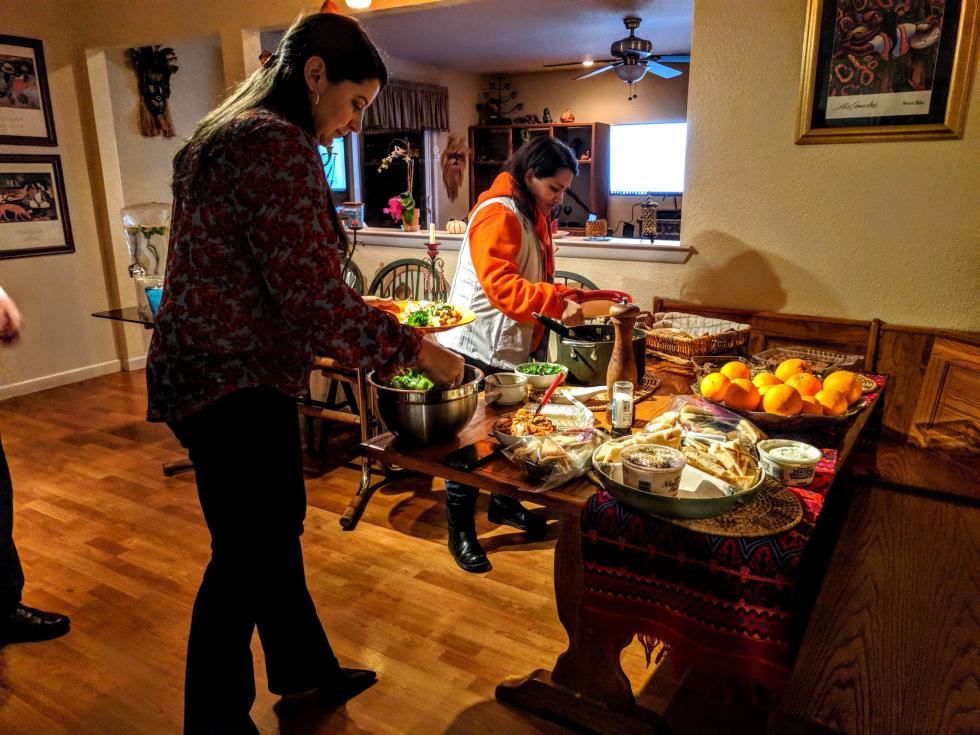
DFW’s Motto, Embodied
Dining for Women uses education to encourage action on behalf women and girls around the world. “We’re trying to create global citizens — people who understand more about how the world works for women and girls and want to do something about it, want to make it better,” Dougall says.
And it’s working in the Capital Region. Last year, Al Olaby’s Junior Girl Scout troop studied grantee Caravan to Class and presented information about the nonprofit at a monthly chapter meeting. Caravan to Class received $42,260 to bring literacy to nomadic children in Mali by educating nomadic moms in basic reading, writing and calculating in their native languages, and then teaching them how to teach their children.
“Each one [of the girls] felt more appreciative of what they had,” Al Olaby says of her troop. “They felt that they were blessed to have such privilege and high quality education. And because they had that, they wanted to make sure other girls were getting the same thing they had, because every girl deserves a good education.”
The Girl Scouts’ experience highlights an added benefit of the Dining for Women model: “We’re not just transforming lives of the girls and women we support, but also of the women in our chapters,” Frattolin says. “We’re changed, too.”



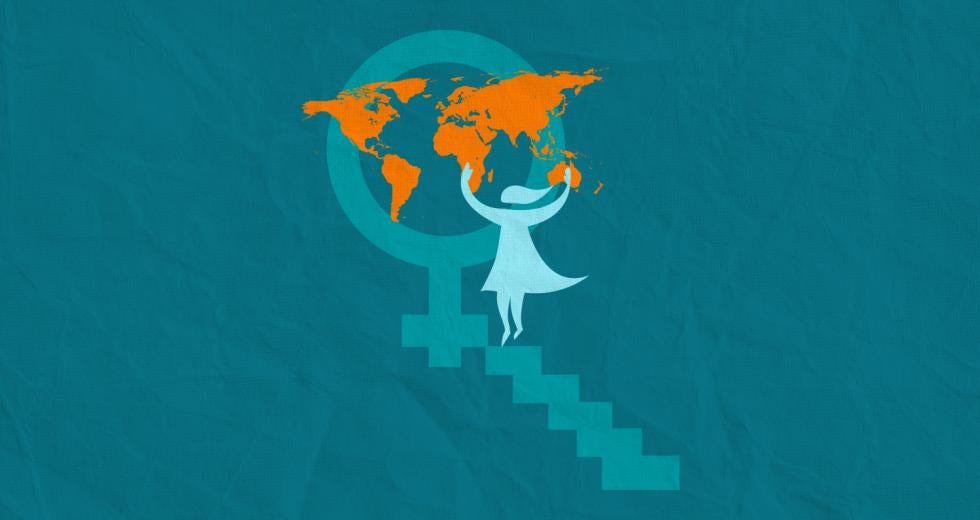
Comments
I am Regional Co-Leader for the West Region of Dining for Women and would like women who live or work in or near Davis to know that we will be hosting a presentation about Dining for Women in Davis on International Women's Day, March 8, from 6:00 - 8:30 pm! If you would like to attend, please RSVP to me at west@diningforwomen.org, and I will share the address with you. A free dinner will be served.
Patty Karabatsos and I are Regional Co-Leaders for the West Region of Dining for Women and would like to invite women who live or work in or near Davis, CA, to a presentation in Davis about Dining for Women on International Women's Day, Thursday, March 8, 2018, from 6:00 - 8:30 pm. Interested? Please RSVP to us at west@diningforwomen.org, and we will share the address of the event with. A free dinner will be served. Seating is limited.
If there are ANY ladies in the Sacramento region interested in joining our chapter or just want to check it out we'd love to have you! Please reach me at ingrid@findingmyplace.net.
If any ladies in the Sacramento region have an interest in checking our chapter out we'd love to have you, we're a fun bunch! Please reach Ingrid for info at ingrid@findingmyplace.net.